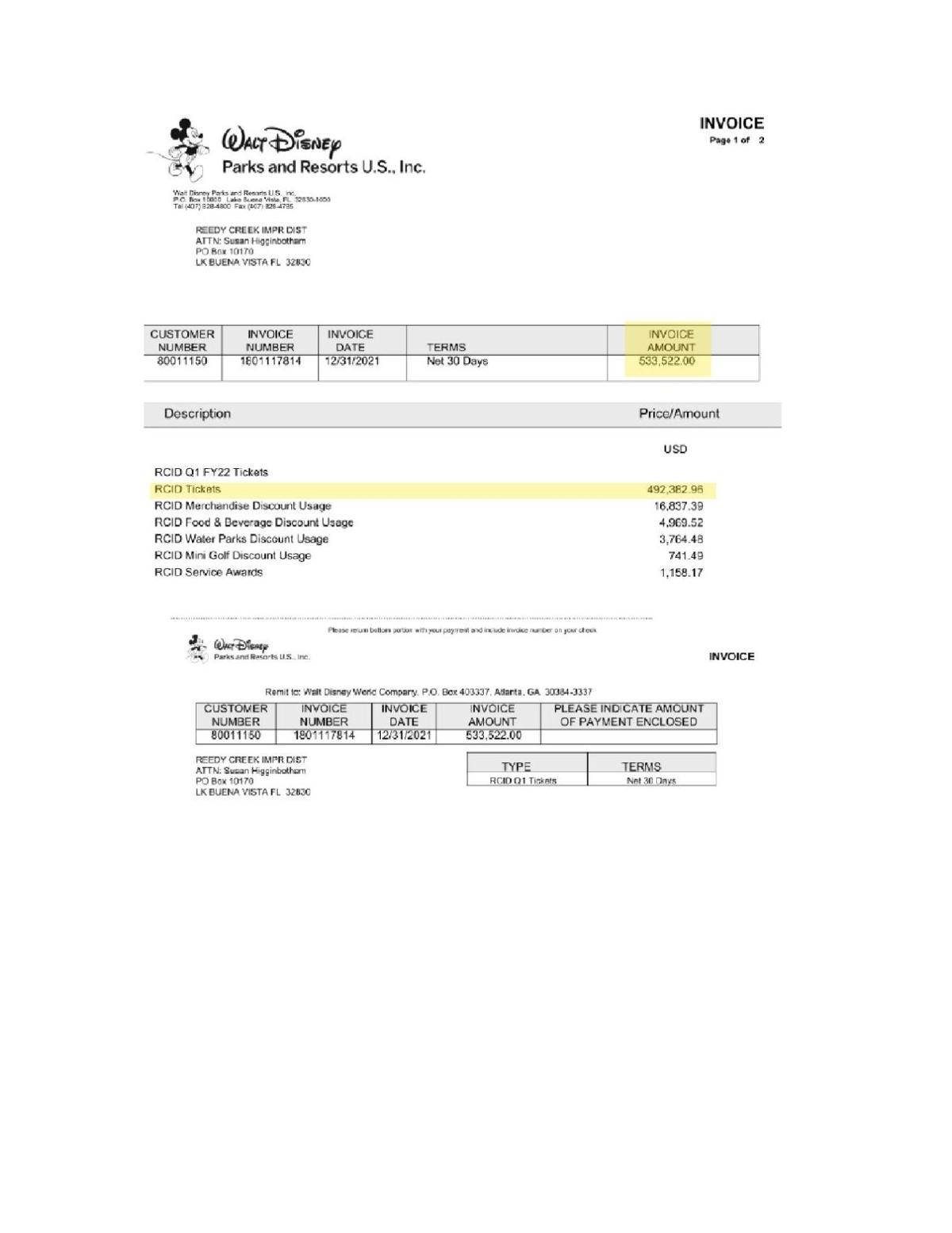
Report alleges Disney-controlled government was ‘private corporate monopoly’
An audit report issued by the Central Florida Tourism Oversight District says its predecessor, the Reedy Creek Improvement District, functioned as part of the Walt Disney Company rather than an independent local government.
The report commissioned by state law also said the entertainment giant ($12.9 billion in income in fiscal 2023) gave Reedy Creek employees the same perks it gave corporate employees. This would be things like annual passes to Disney properties worldwide for the district employees and three family members, steep discounts on Disney merchandise, 40% discounts on Disney cruises, free nontransferable tickets during the holiday season.
According to the report, Disney provided initially these benefits for free, but then the district began reimbursing the entertainment giant for the perks, which added up to millions annually. In the first quarter of fiscal 2022, that added up to more than $533,000 according to an invoice attached to the nearly 80-page audit report. The new oversight district’s board is seeking a settlement with the IRS since accounting firm Cherry Bekaert determined that these constituted taxable benefits on which no tax was paid.

The audit also highlights how Disney didn’t pay transportation impact fees in Orange County.
Each development in Orange County has to pay $3,600 per suburban hotel room. Disney, through the governance of Reedy Creek, was exempt.
Auditors said that if the county’s transportation impact fees were applied to Disney’s more than 36,000 hotel rooms, amusement parks and office, commercial and retail space in the Reedy Creek Improvement District, Disney would have owed hundreds of millions of dollars that could have funded road projects, expanded nearby Interstate 4 and helped the more than 100,000 Disney employees who are plagued with long commutes since there is little or no living space on district property.
The report estimates the fees would add up to nearly $130 million for just Disney’s hotel rooms.
Also pointed out by the report was the spending of Reedy Creek administrators, who allocated hundreds of thousands of dollars on “employee relations” events that included “extravagant” holiday parties and retirement parties. The report said the former district administrator charged hundreds of thousands of dollars on his district American Express card for sports tickets, celebrations, memberships and other events.
Auditors said the district didn’t comply with transparency laws when it came to public access to records and meeting agendas of the district’s board, along with failing to transcribe meeting minutes. It even paid the property taxes of the Board of Supervisors and, until 1998, Disney had the district’s employees on its payroll.
“This was an improper cash gift to board members and further evidence of their capture by Disney,” the report said about the company’s payment of board members’ property taxes.
The board, according to the audit, was controlled by Disney because members were selected in a vote of district landowners, with votes allocated for each acre owned. They were also only eligible to serve if they owned land in the district. Disney deeded five-acre plots to board members for the duration of their service and those plots reverted to the company when their service ended.
The Reedy Creek Improvement District was created by the Florida Legislature in 1967 as part of the package to bring Disney to central Florida. The district’s board had the power to use bonding authority to build infrastructure such as stormwater and roads, was exempted from Orange County regulations and had the ability to build an airport and a nuclear power plant in its boundaries.
The report says the district used “inadequate procurement policies that did not ensure the district obtained the best price or highest quality goods and services for its contracts” and made sure that Disney-favored vendors received contracts.
The 39-square mile area under the district’s oversight was nearly all Disney property. According to the report, the company pledged to lawmakers that it would build “affordable housing, transportation, and other social and community services,” which it never did.
The audit also said the outgoing Reedy Creek board tried to lock in long-term deals favorable to Disney before its dissolution and which are the subject of litigation in state court. The report also says while Disney pays property taxes in both of the counties – Orange and Osceola – where its property is located, the company has filed dozens of lawsuits to try to reduce that tax burden.
“It’s not surprising that Disney is upset,” the report says. “No one would expect a company that’s grown obese on a steady diet of gigantic portions of exemptions and privileges to peacefully pass back the plate.”



